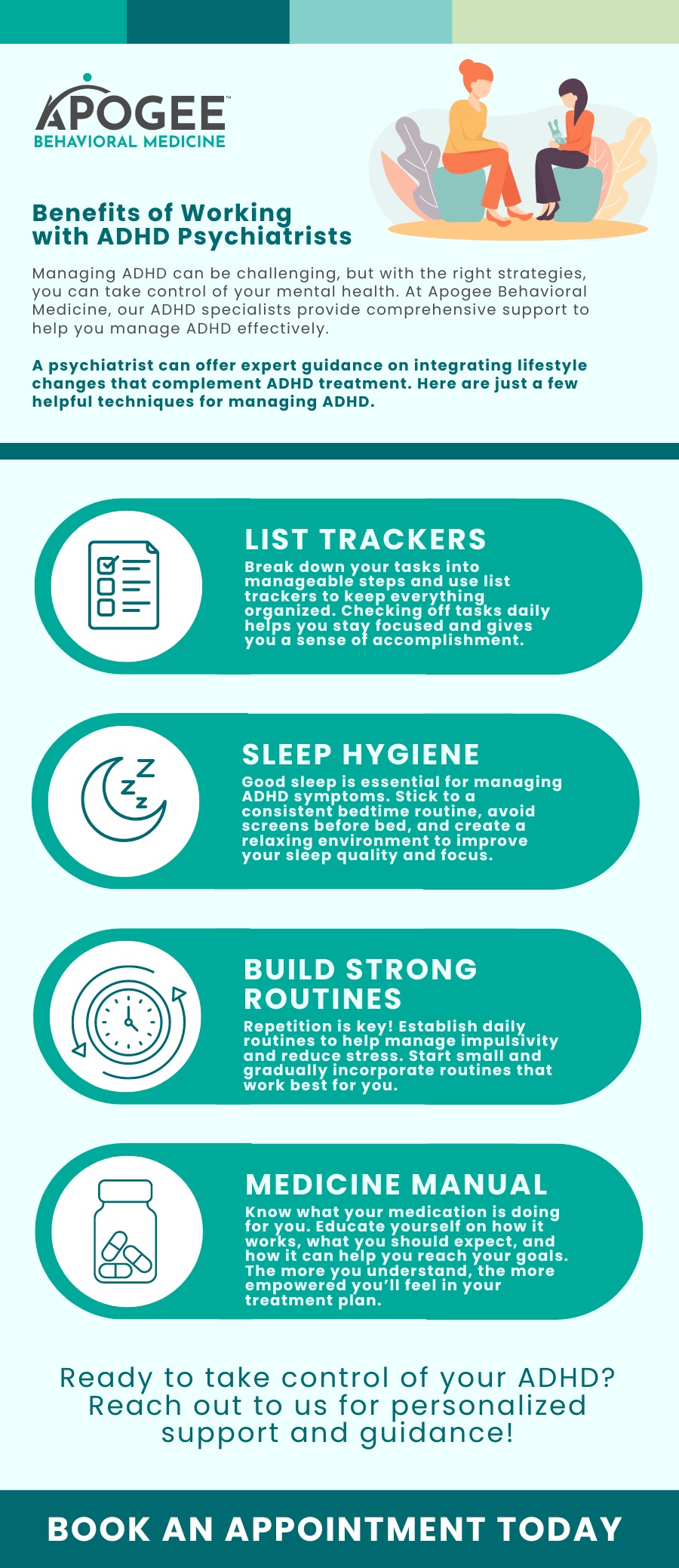
Destigmatizing Mental Health Counseling for College Students
August 21, 2024
Find a Therapist for Anxiety
October 24, 2024Treating Attention Deficit Hyperactivity Disorder is not a one-stop psychiatrist shop. First of all the diagnosis should be individualized, and considerations must be taken into account, which are beyond prescribing medicines. The exact benefit of working with a team of specialists is that they pull together decades of experience to identify the best methods for providing relief to symptoms with and without medicine. To treat a person with ADHD is not just to diagnose them, it is to understand their precise condition and treat the whole person, including their lifestyle and situation.
Diagnosing ADHD
“But my grandfather had ADHD, and he did just fine…..” We hear a lot of this type of stigma and belittling conversation amongst different generations in their reaction to an ADHD diagnosis. It isn’t untrue, up until the 1960’s, ADHD was not formally recognized by the American Psychiatric Association. From the 1960s to the 1980s the disorder was recognized as attention deficit disorder with or without hyperactivity. In our modern understanding of neurodevelopmental disorder, we know that it does not have to do with intelligence, it has a strong genetic component, and the environment plays a role.
Today we see children most commonly diagnosed with ADHD and some adults. More males are diagnosed than women, and the most common medical treatment is a stimulant called Ritalin. Since medical interventions are common, a proper diagnosis must be made by a psychiatrist or medical doctor. It should entail a medical exam to rule out other conditions, interviews with the person/child, their teachers/family, and tests in a variety of locations from school to home. Adult diagnosis may include aptitude tests and inquiry into old school tests and teachers, it often is not made unless confirmed since childhood.
Apogee Behavioral Medicine implements a Creyos diagnostic method for the diagnosis of ADHD. We also run medical tests to ensure that you are not suffering from vitamin deficiencies or other medical issues that could impact your ability to concentrate. Beyond these medical tests, we perform cognitive tests and in-depth interviews. A holistic approach is one that we believe is best for finding the proper treatment. This is why we have a number of specialists who work together on your treatment plan. We stress the importance of disorders being on the spectrum, so our patients understand that no treatment plan is the same, disorders and symptoms differ.
Treating the ADHD and Treating the Individual
There are dozens of medications FDA-approved for the treatment of ADHD. 1 in 9 children is diagnosed with ADHD in the United States and the demand for treatments that are effective, safe, and have positive outcomes, for years to come, is high. However, treating ADHD is not merely getting a prescription that reduces symptoms and increases academic and social performance, it must be combined with education and lifestyle modifications, and above all, individualized.
Sadly, many behavioral health clinics and doctors who treat ADHD, use medicines and are not patient-centered advocates, who understand that many parents and patients are not looking to be medicated with the next best drug. Especially where we are more acutely aware of the long-term effects of medicines, making lifestyle modifications that can improve the ability to thrive is much more desirable. It is well-documented and researched that maintaining good sleep habits, a healthy diet, and keeping a schedule, contribute to reduced symptoms of ADHD. But, how do you know what exactly is right for you or your child?
Patient-Centered Specialists
We believe in patient-centered treatment plans and care. Many of our patients and families who are dealing with ADHD symptoms would like to try lifestyle modifications and cognitive and occupational therapies, prior to medical interventions. With a suite of diagnostic tools, and as advocates for our patients, we design treatment plans with their express needs and wants in mind. It is really important as providers, that we see and hear our patients and give them a holistic plan and educate them as to what is really working for patients and families right now.
Apogee Behavioral Medicine provides not only education on medications, current approvals, and context for how new medications are being used, but we also provide extensive psychoeducation on lifestyle modifications. The infographic below shows some of our top modifications for adults, young adults, and children with ADHD. Some of the benefits of cognitive therapy, which is also part of our treatment plans, is that they can discuss thought patterns and how to shift perspectives in your job and relationship and improve the efficacy of medications. We see the whole patient when we have a family or individual come for an ADHD evaluation, and treat them with the totality of our resources.
If you are looking for a team of specialists to help your family, or you individually, manage an ADHD diagnosis, or for an ADHD evaluation, reach out to Apogee Behavioral Medicine.

